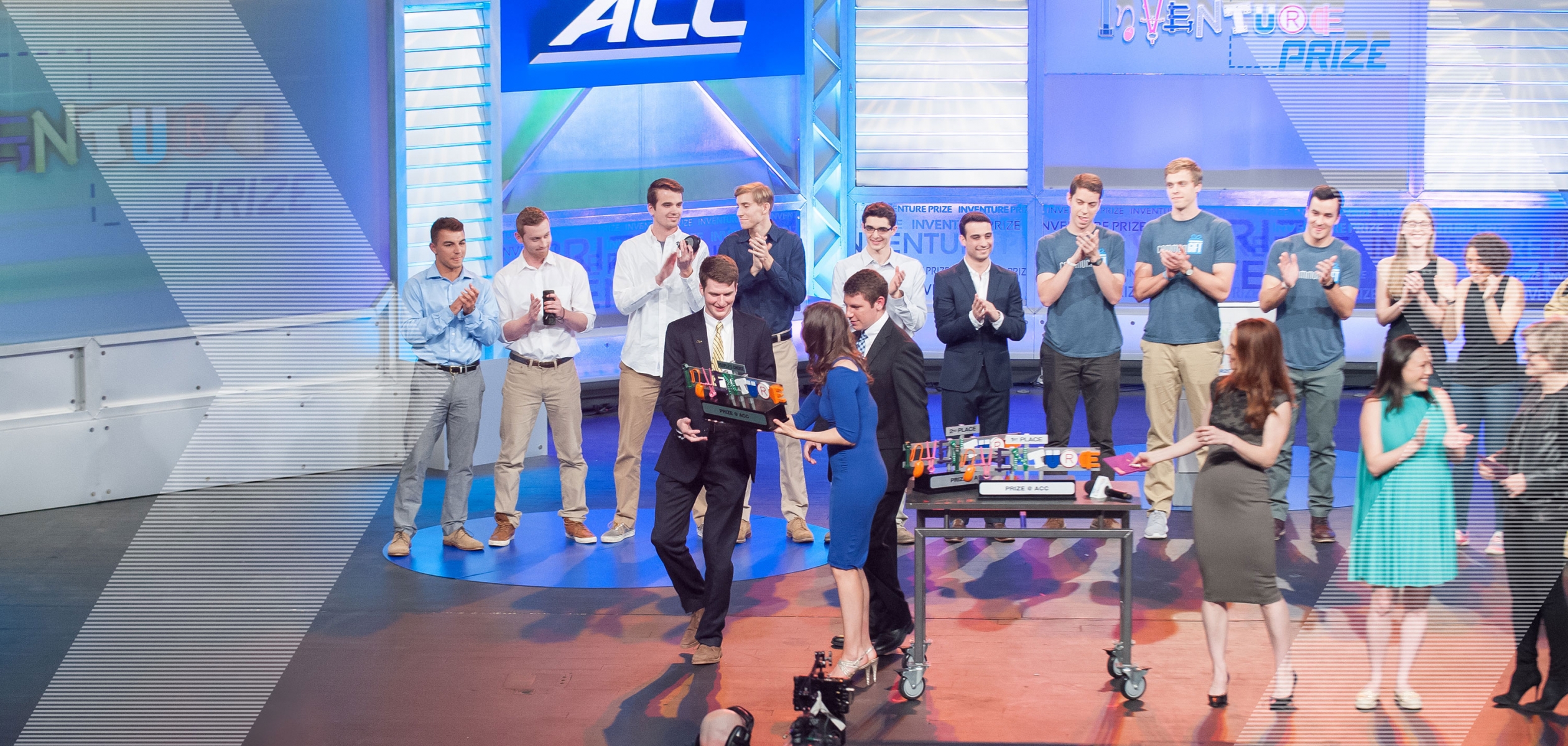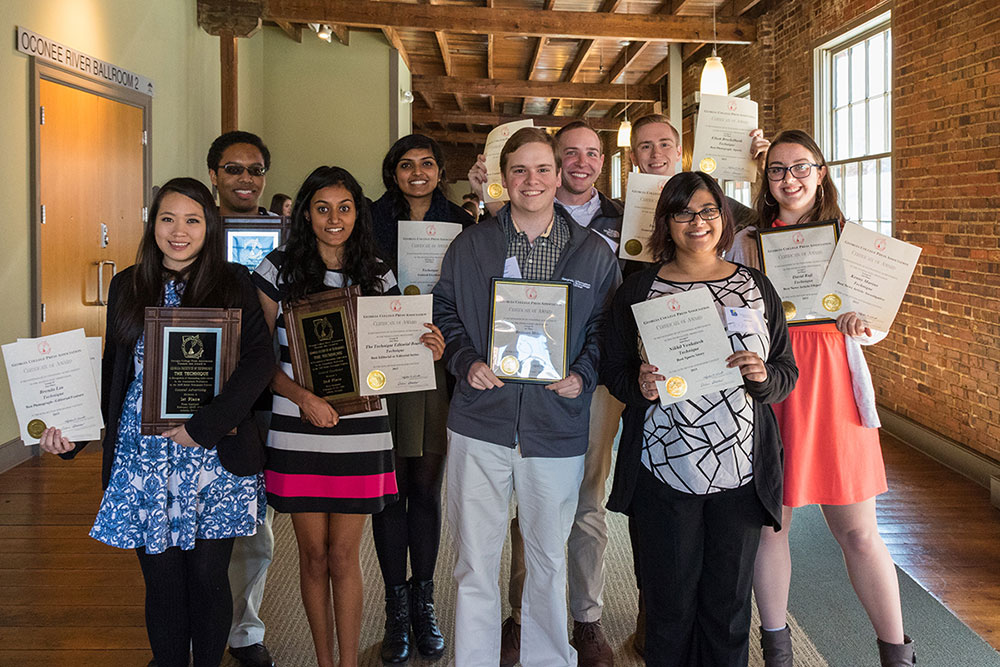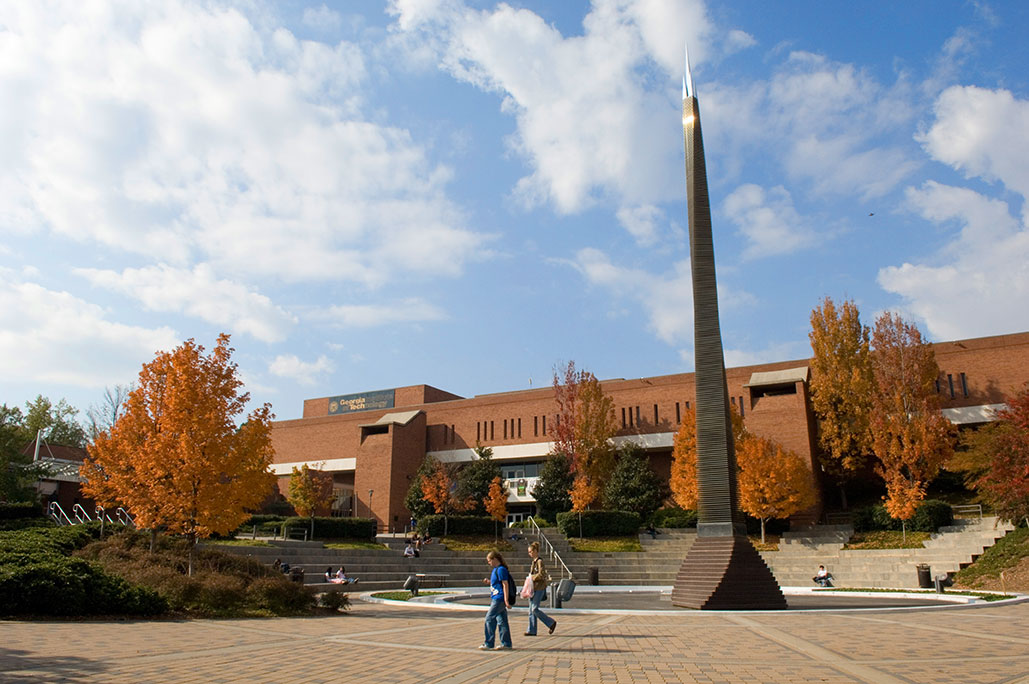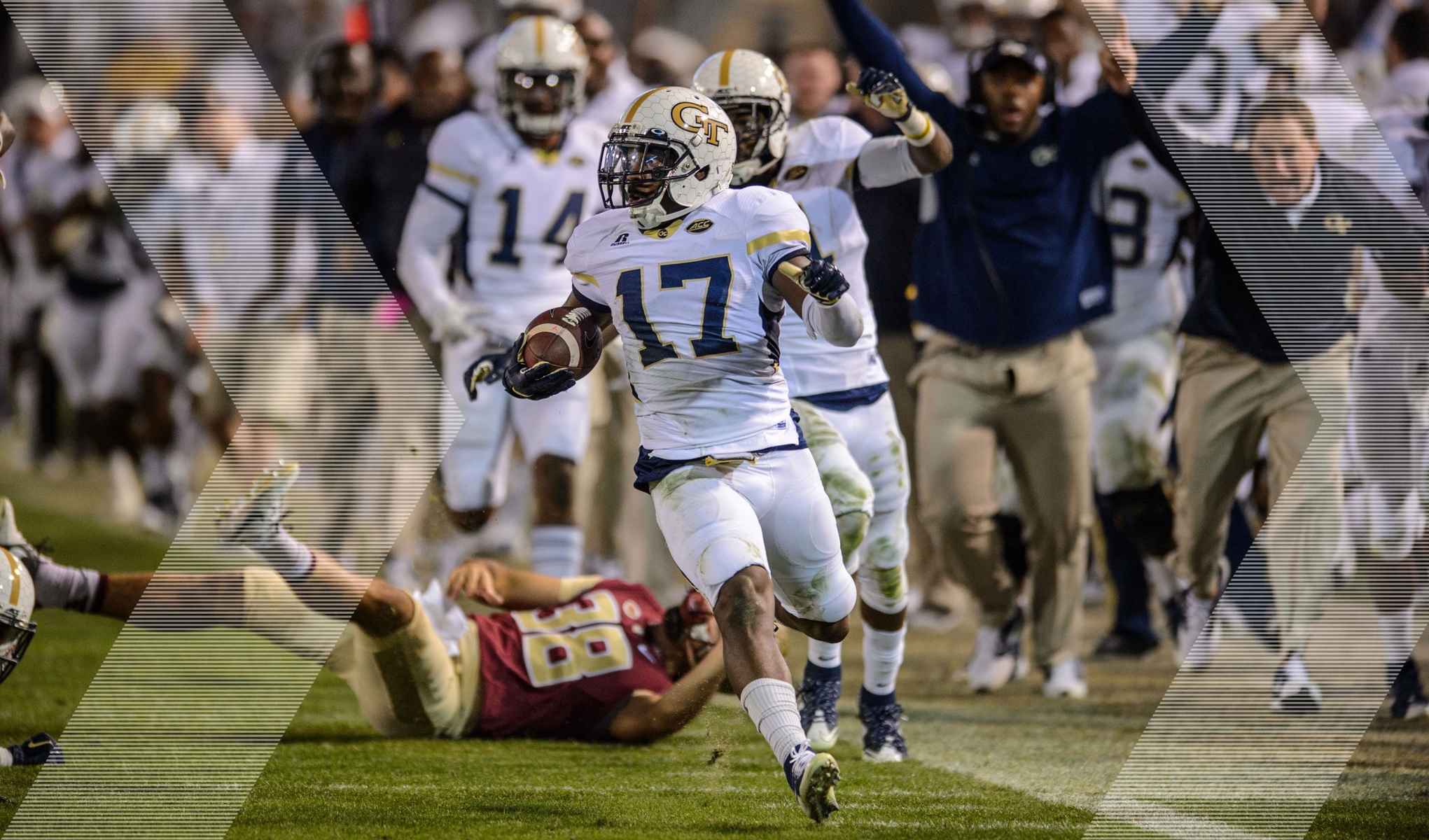
Annual Report Navigation
Fostering Student Ingenuity and Success
Georgia Tech students are renowned for imagining what’s next and driving innovation. Supporting their creativity and entrepreneurial success — and recognizing their varied and prestigious achievements — is among the Institute’s highest priorities.
Entrepreneurship
InVenture Prize Winner Honored at New ACC Competition
FireHUD, a Georgia Tech student invention designed to protect firefighters, not only won the Institute’s InVenture Prize but also received the People’s Choice Award at the inaugural ACC InVenture Prize held on the Tech campus.
Zack Braun, a computer engineering major, and Tyler Sisk, an electrical engineering major, invented FireHUD, a head-up display that attaches to a firefighter’s mask and measures heart rate, respiratory rate, blood oxygen level, body temperature, external temperature, and other vital signs. This information will help firefighters know if they are overexerting themselves, which can lead to cardiac arrest. The device also transmits data to the incident commander, who can view it on a computer through an app.
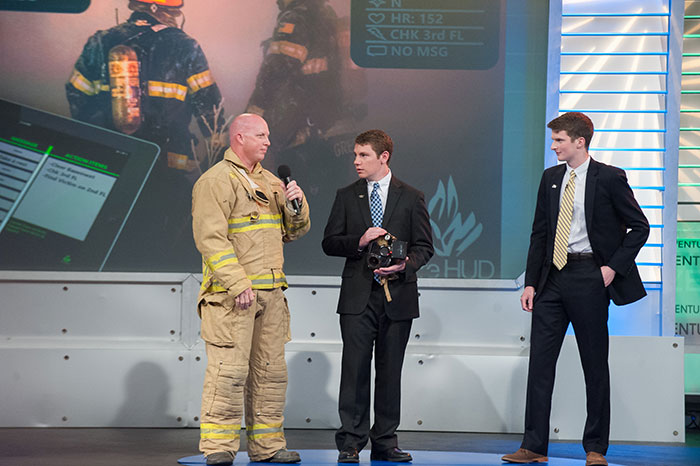
A Georgia Tech student invention, FireHUD won the Institute’s 2016 InVenture Prize competition. FireHUD is designed to protect firefighters via its head-up display that attaches to a firefighter’s mask and measures a variety of vital signs, which helps to avoid overexertion and cardiac arrest.
The team had already won $20,000 in the Georgia Tech InVenture Prize when they received the $5,000 prize from the ACC contest a few weeks later. The prize money will allow them to continue to improve the device, Braun said. “It felt great representing Georgia Tech,” Sisk said. “It made this win a little bit more special because we were here for Tech.” Winners of the ACC InVenture Prize were the BioMetrix team from Duke University (first place and $15,000) and Contraline from the University of Virginia (second place and $10,000). Georgia Tech will continue to have a strong presence with the ACC InVenture Prize as the 2017 competition is scheduled to return to campus. Georgia Tech Provost Rafael L. Bras said that Institute leaders were looking to celebrate the strong academics found in all the ACC schools and agreed that the ACC InVenture Prize was a great way to accomplish that goal.
TI:GER Team Wins 2016 Startup Competition
A technology that can better remove heat from electronic devices won Georgia Tech’s 2016 Startup Competition, which includes a $10,000 prize.
The winning team, BanyanTech, evolved through Georgia Tech’s Technological Innovation: Generating Economic Results (TI:GER) program. The program teams Georgia Tech Scheller College of Business MBA students with Emory University law students who work together on commercializing a Ph.D. student’s scientific research.
Banyan’s Matt Smith, a Ph.D. candidate in materials science and engineering, said that his team was originally focused on connecting computer CPUs to heat sinks in consumer electronics packaging, but that “as a startup we will need to break into a less established industry with small-scale manufacturers that are willing to implement startup materials into their product line.” Banyan has shifted their focus to providing thermal solutions for the rapidly growing LED market.
The team also includes first-year MBA students Akshay Ravi and Ajaay Ravi, and second-year Emory law students Forrest Lind and Lorrin Stone.
The Startup Competition focuses on discovering a market opportunity and creating an innovative business model to address it. “Giving the pitches and getting feedback from the judges was a great experience, as well as getting out of the building and talking to potential customers,” said Smith. The competition is sponsored by the Scheller College of Business and Georgia Tech’s Venture Lab.
Tech student team named finalist for Startup of the Year
Just six months before being named finalists for the Startup of the Year competition, Josh Lieberman and Isaac Wittenstein were participating in Startup Lab, a class that exposes students to startups and teaches them how to develop a business model. Both were interested in the electric vehicle market. At the same time, Dorrier Coleman was experimenting with electric vehicles as part of his Capstone Design project.
The three Tech students co-founded TEQ Charging, a startup that invented a power strip that allows multiple electric vehicles to be recharged by a single charging point. They traveled to Las Vegas last fall as finalists for Tech.Co’s annual Startup of the Year. TEQ also earned second place in Atlan10, which ranks the most innovative young startups in Atlanta.
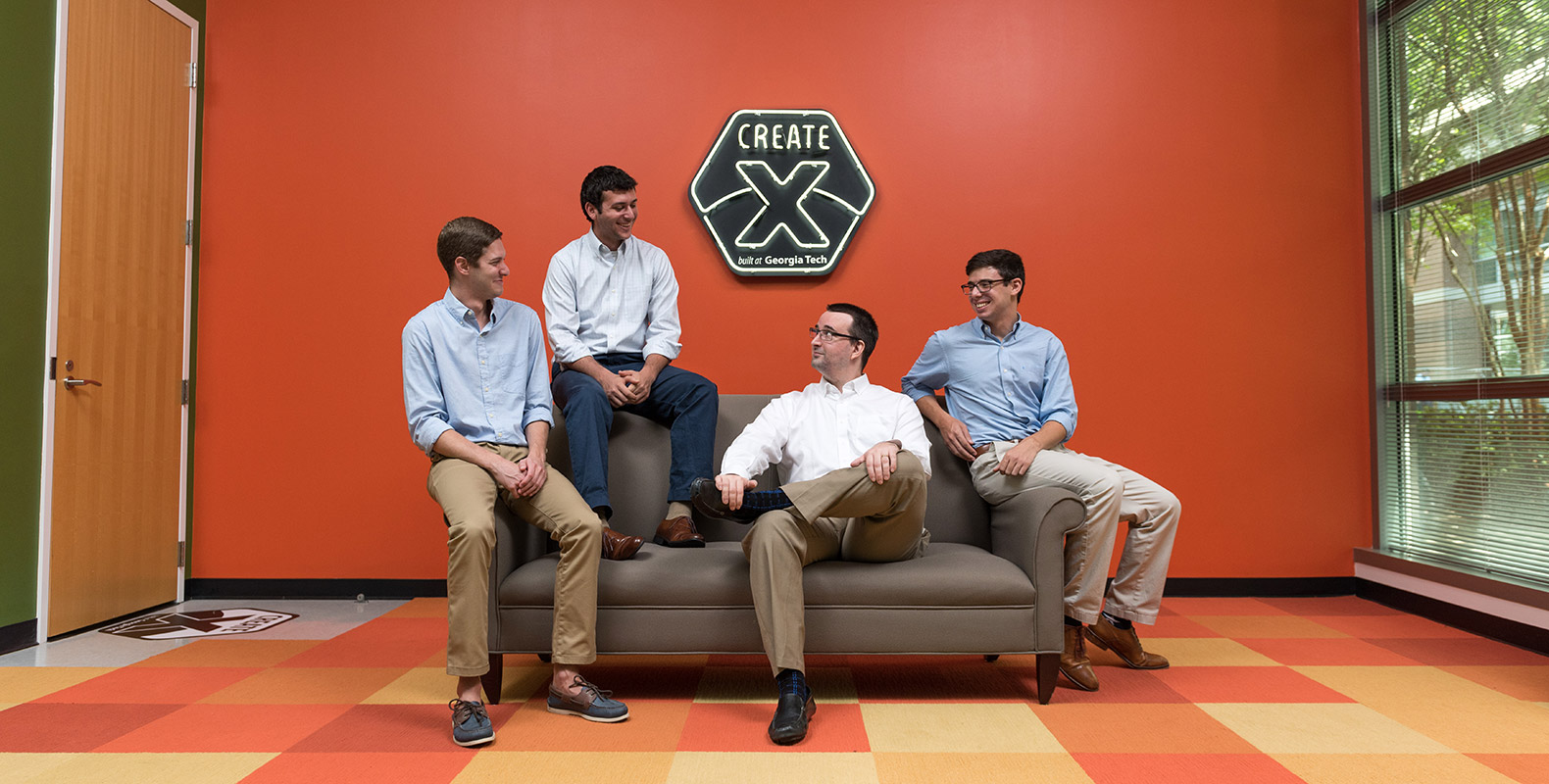
Mitchell Kelman, Josh Lieberman, Dorrier Coleman and Isaac Wittenstein of TEQ Charging.
“Georgia Tech has given us the opportunity to be where we are right now.”
Josh Lieberman
The launch of TEQ took place during Startup Summer, a part of CREATE-X, which is a Georgia Tech initiative to enhance and support entrepreneurship programs for undergraduate students. The new program is one way the Institute is preparing the nation’s next entrepreneurs.
“Georgia Tech has given us the opportunity to be where we are right now,” said Lieberman, CEO of the new company. “Without it, we would not have been able to clearly define our business. This definition has allowed us to build a strong business and be a finalist for Tech.Co Startup of the Year.”
TEQ eliminates a main source of frustration for electric vehicle drivers: seeing one car plugged into a charging point all day while other drivers wait to connect. The power strip solves that problem by servicing multiple cars at once. Their patent-pending algorithm and hardware design eliminates the need to run a separate power line to each individual charger.
Students spend summer launching startups
Shiv Patel initially thought he had invented a solution to a problem plaguing roommates. His original idea would help people split expenses on everything from pizza delivery to vacation homes.
Patel's is one of the teams picked for last year’s Startup Summer, a 12-week internship for Georgia Tech students and recent graduates who want to launch startups based on their own inventions and prototypes. The program teaches students to understand potential customers and the market so they can build a product or service that addresses a real and quantified need.
After that approach showed Patel the faults in his idea, he put aside his original concept and instead created Mercez, a tool to help people when they’re traveling and shopping abroad. The company’s first product, TrueCost, helps people avoid foreign transaction fees, unfavorable exchange rates, and miscellaneous fees by providing daily updates showing which of their credit cards provides the best deal on any given day.
“I have motivation, but Startup Summer gives me the support and structure and honest advice I need,” said Patel, a computer science major. “Instead of letting me be discouraged when my first idea didn’t work, they helped me ask the questions I needed to find something else.”
That entrepreneurial confidence to try and try again is what Georgia Tech wants to instill in students, said Raghupathy Sivakumar, the Wayne J. Holman Chair in the School of Electrical and Computer Engineering and a Startup Summer instructor. The confidence comes from the methodical steps students take in the program. They incorporate companies, perform customer discovery, build product iterations, determine pricing strategies, gain customer traction, take the product to market, and deal with founder equity allocations. Startup Summer is part of CREATE-X.
Growth in Admissions/Diversity
Admissions, Retention, and Graduation Rates Set Records
Applications for fall 2016 undergraduate admission hit a record high of 30,520 — a 12 percent increase over the previous year. Of that number, 26 percent were offered admission (between early action and regular decision rounds).
The academic profile of accepted students continues to be more impressive each year. This year, the average SAT is 1445 (out of 1600), with 10 college-level courses completed.

In addition, the Institute’s first-year retention rate rose to 97 percent, which is a record for the Institute and strengthens Tech’s position among the nation’s most elite universities. This figure measures the percentage of a college’s first-time freshmen who return the following year. The national retention rate average for public four-year universities is 80 percent.
Georgia Tech also set new records in graduation rates. The Institute’s five-year graduation rate rose to 80 percent, while the six-year figure climbed to 85 percent. That compares to national averages of 55 percent and 59 percent, respectively, according to the National Center for Education Statistics.
“It takes an entire campus community to achieve these high retention and graduation rates,” said Steven Girardot, associate vice provost for Undergraduate Education. “I’m proud of the efforts of our faculty and administrators, who work very hard to support student success from the first day a student arrives on campus until the day they graduate.”
Focus Program Sees Significant Growth
For 25 years, Georgia Tech has offered the Focus graduate recruitment program on the same weekend that the nation celebrates the life and work of Martin Luther King Jr. This program attracts and recruits the nation’s best and brightest diverse students to pursue graduate studies and careers in academia.
Last January, 191 students participated in Focus — up from 160 participants in 2015. Among this year’s participants, 105 students were female and 143 were Ph.D. candidates. This marks respective increases of 28 and 21 percent from 2015.
“We are proud to have accepted 55 percent women to the Focus program this year, and this trend mirrors Georgia Tech’s record-setting freshman class being 41 percent female — the first class to ever top 40 percent,” said Andre Dickens, assistant director of outreach initiatives at OMED: Educational Services, a unit of Institute Diversity.
In addition, this year’s Focus program participants represented 78 colleges and universities from approximately 25 states and U.S. territories.
“Before Focus, I had no idea that there was such a welcoming place for me in the United States,” said Morolake Omoya, an undergraduate student at UCLA. “Georgia Tech has always been my dream graduate school, and I am thankful to all the organizers of this program for opening my eyes to a bright future.”
The four-day program includes campus and city tours; department and lab visits; panel discussions on graduate admissions, fellowships, scholarships, mentoring, and alumni insights; and the President’s Dinner.
Athletic Excellence
Athletic Teams Post Impressive ‘Report Card’
Each of Georgia Tech’s 15 athletics programs is in good academic standing, while three teams led the Atlantic Coast Conference, according to the latest Academic Progress Rate statistics released by the NCAA.
This latest NCAA APR report is based on scores from the 2011-12, 2012-13, 2013-14, and 2014-15 academic years.

An impressive 13 of Georgia Tech’s 17 teams scored 980 or better out of a possible 1,000 points, while 12 teams posted either identical or better scores from the previous APR release – baseball, men’s cross country, women’s cross country, football, golf, men’s swimming and diving, women’s swimming and diving, men’s tennis, women’s tennis, men’s track, women’s track, and volleyball.
Golf (1000), men’s swimming and diving (1000), and volleyball (1000) are all tied for the top multiyear APR score in the ACC, while football (987) has the second-highest APR among ACC football programs. Softball (989) and women’s swimming and diving (995) are tied for the third-highest scores in the ACC.
In addition, four Yellow Jacket teams were publicly honored for being among the top 10 percent in APR. Football, golf, men’s swimming and diving, and volleyball each received APR Public Recognition. The golf program has received an APR Public Recognition Award every year since the APR’s inception in 2006.
What's next? ![]() Celebrating Our World-Class Faculty and Staff
Celebrating Our World-Class Faculty and Staff
Annual Report Navigation
(text and background only visible when logged in)
